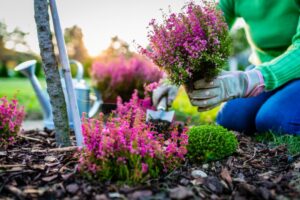
Today, millions of people struggle with sleep, whether that’s due to mild instances of sleep apnea, the fast and stressful pace of life, or habitually scrolling through a phone for hours before bed. Sleep deprivation can affect countless aspects of your life, from keeping you from being able to focus on work to chronic fatigue that makes you feel like you can’t complete anything you need to.
While there are a number of answers to this issue, ranging from pharmaceuticals to sleep apnea appliances, studies show that gardening can also have a positive impact on your quality of rest. Read below to learn how flexing your green thumb can do more for you than yield delicious fruits, vegetables, and herbs.
Sleep Deprivation & Its Causes
Depending on the other symptoms you’re exhibiting, you may find that any of the following are causing your fatigue:
- Chronic medical conditions that are untreated, like acid reflux.
- Obstructive sleep apnea or other forms of sleep apnea.
- Using screen technology that emits blue light before bed, like smartphones and tablets.
- Stress, depression, and anxiety.
- Consuming tobacco, alcohol, or coffee before bed.
- Chronic pain.
The best way to pinpoint the underlying cause of your poor sleep is to visit a sleep doctor in McKinney. Based on their evaluation, you may find that only a few lifestyle changes can help drastically improve your quality of rest, or you may learn that you require treatment.
Unique Sleep Benefits of Gardening
A study that included nearly 60,000 participants from the 2017 Behavioral Risk Factor Surveillance System showed that participants who gardened regularly experienced fewer sleep complaints. These included sleep apnea, short sleep duration, waking up multiple times throughout the night, insomnia, and sluggishness. So, what’s the link?
While this study doesn’t conclusively prove that gardening helps people sleep better, there are a number of positive effects that it has that could influence your quality of rest, including:
- Physical Activity: Gardening involves bending over, digging, weeding, harvesting, and exercising almost all of your muscle groups, from your back to your arms and legs. Not only does this improve cardiovascular health and flexibility, but regular physical activity helps tire the body and contribute to deeper sleep.
- Exposure to Sunlight: When you’re spending time outdoors gardening, you’re also receiving great sunlight exposure that helps regulate your circadian rhythm, or your body’s clock. This lets your body know when it’s time to go to bed and influences your brain’s production of melatonin.
- Reduction in Stress: Being outdoors and nurturing nature is a tranquil activity that has been shown to reduce cortisol levels, which is the body’s primary stress hormone.
Other Treatments for Sleep Conditions
If your restless nights are the result of a medical condition, like sleep apnea, other treatment interventions may be necessary. This typically includes CPAP therapy or oral appliance treatment. The best way to learn whether or not these apply to your situation is to visit a sleep expert for testing.
The rewards of gardening are in a class of their own, from being able to enjoy fresh vegetables and herbs to improving your flexibility and health. However, while your green thumb may play a role in minimizing your sleep problems, and for less extreme cases, solving them, i doesn’t always replace the need for seeing a sleep expert.
About the Practice
At Star Sleep & Wellness in McKinney, our team of sleep experts is well-rounded and comprised of sleep physicians, dentists, nurse practitioners, and physician assistants. As a result, patients are able to address all of their underlying needs in one location, from sleep testing to several different treatment options. To schedule a consultation, visit Star Sleep & Wellness in McKinney’s website or call 844-409-4657.
